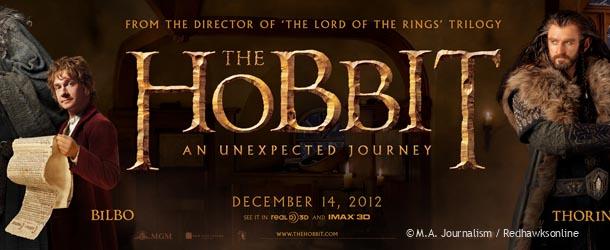An unexpected journey to an imaginative world
In September 1937, Oxford professor J.R.R. Tolkien published his first fictional book, The Hobbit, to wide critical acclaim. Set in an intricate world of high fantasy, Tolkien uses the novel to introduce his personal creation, hobbits, a species of humanistic, dwarf-like creatures that live peaceful lives in the folksy fabrications of the Shire. His main character is a hobbit by the name of Bilbo Baggins (you may have heard of him).
The Hobbit follows the genre-based storyline that high fantasy stories often contain, with unlikely heroes joining together in order to conquer a quest to a certain degree (in this case, a dragon guarding a sacred treasure).
Tolkien went on to write the three-volume Lord of the Rings series which was the first to be adapted to film. And now it seemed only necessary to continue the franchise with a not just one, but three blockbuster adaptations of the preceding novel that started the whole series with themes of personal maturity, boldness, and mental endurance.
The first of a planned series, The Hobbit: An Unexpected Journey, directed by Peter Jackson (director of the Lord of the Rings trilogy) debuts in theaters tonight, and it triumphs as a film with both chimerical and contemporary techniques.
In a story meant to capture the adventurous attitude of breaking the walls of comfort in order to prove one’s self-worth and courage, this ploy is not only a subject ventured by the protagonists, but by fans of the series as well. Those familiar with the Lord of the Rings epic will find nostalgia in the likes of Ian McKellen (Gandalf) and Andy Serkis (Gollum), who return to Middle Earth amongst many new faces, but must also adapt to the additional cast and storyline.
In a way The Hobbit makes its fan base shuffle outside its comfort zone, one that is used to the masculine, ambitious Lord of the Rings and feeds them the more boyish light-hearted, yet still symbolic tale of heroism that The Hobbit offers. However, just because the new film’s overall tone isn’t as elaborate as its older brothers, its spirit and depth make it just as worthy.
Martin Freeman’s role as the humble, homebody Baggins – along with the ragtag brethren of dwarves – is what carries the film with the complete essence of loyal fellowship. Quizzical and timid initially, Freeman brings to life a relatable character who grows from hobbit-sized beginnings to one willing to risk his life for another.
Whether it’s in the heat of battle with a band of malevolent, pale-skinned orcs or clashing in a verbal duel of riddles with the schizophrenic creature Gollum, Freeman exposes both the physical and mental struggles within Bilbo’s character. His performance, accompanied by his capable supporting actors ,conjures a bold posse of traveling opportunists.
The fictional world of Tolkien’s imagination has never appeared more colorful and sophisticated than in The Hobbit. Visuals of anthropomorphic beings, jagged silver mountains, and lush, tumbling valleys are what make up the scenic landscapes of the film; there’s an artistic realism within the effects that make what’s being done on screen both believable and respectable. With such a world to work with, the idea of “leaving everything to imagination” is drop-kicked out of the cinematic window, as every shadow and every frame is given a massive amount of detail.
Some may say that the idea of adapting The Hobbit – a 310-page novel – into three films is a ludicrous strategy to milk the money out of audience’s wallets. And although it’s obvious that gross revenue was one of the many contributors to finalizing the idea, there are benefits to incorporating such a large amount of time into such a well-known story.
As beloved as Tolkien’s novel has been and still is, there’s enough juice packed within the pages of the book to produce a trilogy that can stand as being not only entertaining, but also has the possibility of becoming a classic.
Taking a story so famous and deepening its motifs even further is a way to appeal to both fans of the original novel and people who enjoy good film
The Hobbit: An Unexpected Journey provides a sturdy beginning of a journey that will appeal to both the old and new generation of fans in unexpected ways.

